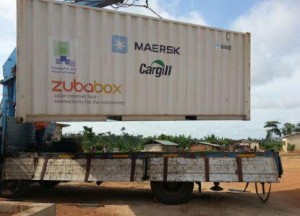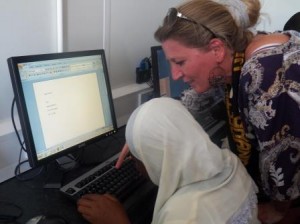Thinking inside the box: Cargill delivers for cocoa community in Ghana
Cargill tweeted me this story and I was happy to give it blogspace. There are times (many in fact) when it seems to me that shipping and the extractive industries it serves are something of a one-way street in terms of taking rather than giving back.
One might call this a somewhat cynical exercise in CSR and reputation management, but I’d rather see CSR demonstrated where it is needed than see good men (and women) do nothing. If you want to lend your support by sponsoring a Zubabox you can get more information here.
In the rural and isolated cocoa growing communities of Ghana, electricity is limited and the cost of internet access highly inflated compared to local incomes. This ‘digital divide’ limits the opportunities for rural communities to acquire information and communications technology skills and access the host of information available in the digital world.
So (if you are Cargill and Maersk Line) what do you do when you have an empty container, a number of used computers, a satellite dish and some solar panels? You think ‘inside the box’ and call on Computer Aid International to send a Zubabox – a solar powered, all-in-one, internet-enabled IT classroom, equipped with 11 reconditioned computers.
 With the support of these two shipping and commodity trading giants, the Asarekwaa community and Asarekwaa Al Furqn Islamic School in Ghana are celebrating the opening of their very own Zubabox – the first of its kind in Ghana. Zuba is the word for Sun in Nyanja – a language spoken in Zimbabwe, Malawi and Southern Zambia.
With the support of these two shipping and commodity trading giants, the Asarekwaa community and Asarekwaa Al Furqn Islamic School in Ghana are celebrating the opening of their very own Zubabox – the first of its kind in Ghana. Zuba is the word for Sun in Nyanja – a language spoken in Zimbabwe, Malawi and Southern Zambia.
The Zubabox is made from a converted shipping container, shipped ready-to-use and which operates without the need for electricity connections or local internet. The school, which has over 390 children and only 11 teachers, is located approximately 150km from the port of Tema.
Speaking at the Zubabox’s opening ceremony, Alfred Fuah, ICT Teacher at the School said: “We are absolutely thrilled that the Zubabox is being placed in the Asarekwaa community and at our school. ICT is an important part of the school’s curriculum, which until now has largely been taught as theory.
 “This computer room will allow our students to put theory into practice, and enable our teachers to research new and exciting lessons. We would like to thank Computer Aid International, Cargill and Maersk Line for helping to link us with the wider world through technology.”
“This computer room will allow our students to put theory into practice, and enable our teachers to research new and exciting lessons. We would like to thank Computer Aid International, Cargill and Maersk Line for helping to link us with the wider world through technology.”
Initially, the Zubabox will be used by the school but there are already plans to open this up to the broader cocoa-growing community particularly farmers.
“The ZubaBox concept was designed to help rural communities access the internet and IT equipment which can have a huge impact on poverty reduction. Learning IT skills at school means children will be able to gain better paid employment in the future,” says Keith Sonnet, Executive Chair for Computer Aid International.
“As we have seen in other locations, extending the box to local farmers can help them access local weather forecasts thereby allowing them to adjust the planting and harvesting times of their crops which in turn leads to increased agricultural productivity and food security,”
Kojo Amoo-Gottfried, Country Manager for Cargill Ghana added: “We are really excited to be a part of this project and provide the school with what is in effect an all-in-one computer library. Research shows that access to computers and the internet can improve education and learning by 40-60%. In Ghana, we work with cocoa farming communities, as part of the Cargill Cocoa Promise to enhance quality of life and tackle issues such as education, health care and gender specific skills. While Ghana’s literacy rates are relatively high, standards of education in rural Ghana are inconsistent. Technology can help rural communities to be better connected and help equip children for the future.”
Syed Naved Uz Zafar, Managing Director of Maersk Line Ghana said: “To Maersk Line, Africa is one of our key growth markets and we have proudly served the continent for decades, enabling African producers and buyers to link more effectively to regional and global markets. The Zubabox is a great example of how we can work with our customers, NGOs and local communities to further empower rural communities in Sub-Saharan Africa to partake more actively and assertively in the global economy.”
